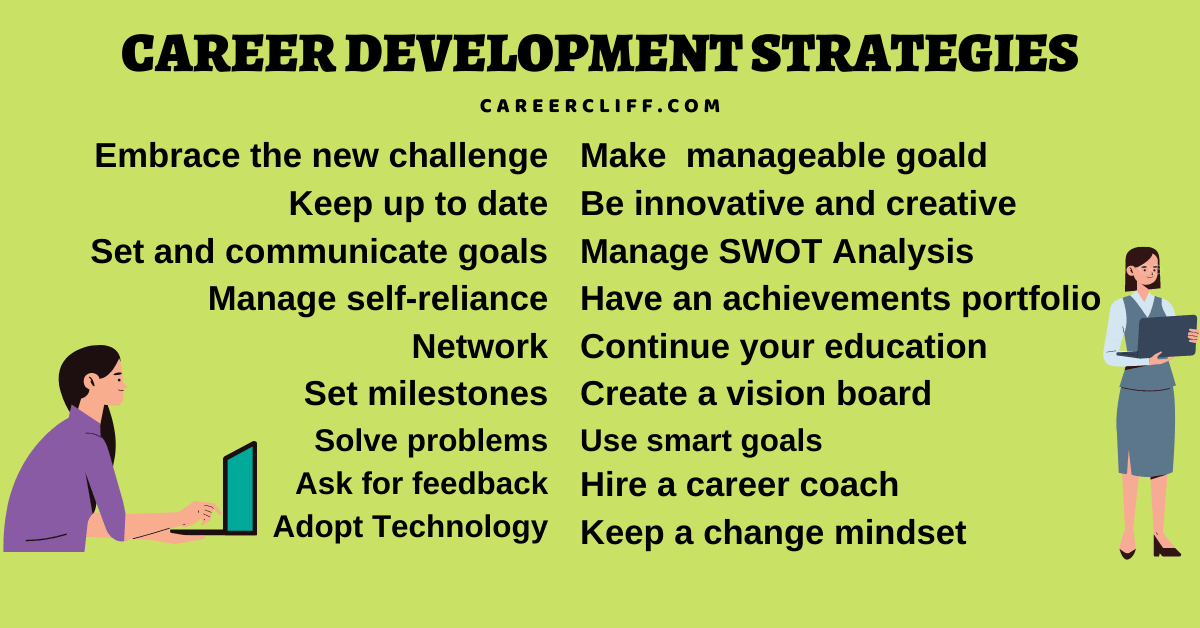Career Growth Strategies set the stage for success in today’s competitive landscape, offering a roadmap to reach new heights in your career. From upskilling to mentorship, explore the key strategies that can propel you forward.
Why Career Growth Strategies are Important
In today’s competitive job market, career growth strategies play a crucial role in helping individuals navigate their professional journey and achieve success. By actively engaging in these strategies, individuals can enhance their skills, expand their network, and explore new opportunities for advancement.
Impact on Professional Trajectory
Effective career growth strategies can have a significant impact on an individual’s professional trajectory. For example, setting clear goals and creating a roadmap for career advancement can help individuals stay focused and motivated to achieve their objectives. Additionally, continuous learning and skill development can make individuals more competitive in the job market and open doors to new and exciting opportunities.
Organizational Benefits
Organizations also benefit from employees who actively engage in career growth strategies. When employees are committed to their professional development, they are more likely to perform at a high level, contribute innovative ideas, and take on leadership roles within the company. This not only enhances the overall productivity and success of the organization but also creates a positive work culture where employees feel valued and motivated to grow.
Types of Career Growth Strategies
When it comes to advancing in your career, there are several strategies you can employ to help you reach your goals. Let’s take a look at different types of career growth strategies and understand their importance in shaping a successful career trajectory.
1. Upskilling
Upskilling involves acquiring new skills or improving existing ones to stay relevant in the ever-evolving job market. By continuously learning and upgrading your skill set, you increase your value as an employee and open up new opportunities for career growth. Employers are more likely to invest in employees who show a commitment to upskilling, making it a crucial strategy for advancement.
2. Networking
Networking is all about building and nurturing relationships with professionals in your industry. By expanding your network, you increase your visibility, gain access to new opportunities, and receive valuable insights and advice from experienced individuals. Networking can lead to job referrals, collaborations, and mentorship opportunities that can significantly impact your career growth.
3. Mentorship
Having a mentor can provide you with guidance, support, and valuable feedback as you navigate your career path. A mentor can share their knowledge and expertise, help you set goals, and offer advice based on their own experiences. Mentorship is a powerful tool for personal and professional development, enabling you to learn from someone who has already walked the path you aspire to take.
4. Goal Setting
Setting clear and achievable goals is essential for career growth. By outlining specific objectives and milestones, you can track your progress, stay focused, and measure your success. Goal setting helps you stay motivated, prioritize tasks, and make informed decisions that align with your long-term aspirations. It provides a roadmap for your career journey and empowers you to take control of your future.
Short-Term vs Long-Term Strategies
While short-term strategies like networking and upskilling can yield immediate benefits such as new job opportunities or skill acquisition, long-term strategies like mentorship and goal setting lay the foundation for sustained career growth and advancement. Short-term strategies focus on quick wins and immediate results, while long-term strategies provide a holistic approach to career development, shaping your career trajectory over time. Both types of strategies are essential for achieving long-term success in your professional life.
Implementing Career Growth Strategies

When it comes to implementing career growth strategies, it’s essential to have a personalized plan in place. This plan should Artikel achievable goals and milestones, while also considering areas for professional development through self-assessment.
Creating a Personalized Career Growth Plan
To create a personalized career growth plan, follow these steps:
- Identify your strengths and weaknesses through self-assessment.
- Set specific, measurable, achievable, relevant, and time-bound (SMART) career goals.
- Research potential career paths and opportunities in your field.
- Develop a timeline with milestones to track your progress.
- Seek feedback and mentorship to refine your plan and stay accountable.
Setting Achievable Career Goals and Milestones
Setting achievable career goals and milestones is crucial for progress. Here are some tips:
- Break down larger goals into smaller, manageable tasks.
- Regularly review and adjust your goals based on your progress and changing circumstances.
- Celebrate achievements, no matter how small, to stay motivated.
- Stay flexible and adapt to new opportunities that align with your goals.
Role of Self-Assessment in Professional Development
Self-assessment plays a vital role in identifying areas for professional development. Consider the following:
- Reflect on your skills, interests, values, and work preferences.
- Seek feedback from peers, mentors, and supervisors to gain different perspectives.
- Identify areas where you can improve or acquire new skills to advance in your career.
- Utilize assessments and tools to gain insights into your strengths and areas needing development.
Overcoming Challenges in Career Growth

As individuals strive to implement career growth strategies, they often encounter various challenges that can hinder their progress. It is crucial to address these obstacles effectively to stay motivated and achieve success in the career growth process.
Dealing with Lack of Opportunities
One common challenge individuals face is the lack of opportunities for advancement within their current organization or industry. This can be discouraging and make it difficult to pursue career growth. To overcome this setback, it is important to proactively seek out new opportunities, whether it be through networking, further education, or exploring different career paths. By expanding your professional network and staying open to new possibilities, you can increase your chances of finding the right opportunity for growth.
Handling Rejection and Setbacks, Career Growth Strategies
Rejection and setbacks are inevitable in any career growth journey. It is essential to develop resilience and a positive mindset to overcome these challenges. Instead of letting rejection discourage you, use it as an opportunity to learn and grow. Stay focused on your goals, seek feedback, and continuously improve yourself to bounce back stronger from setbacks. Remember, every successful individual has faced setbacks along the way.
Balancing Work and Personal Life
Finding a balance between work and personal life is another common challenge that can impact career growth. It is important to prioritize self-care, set boundaries, and manage your time effectively to prevent burnout and maintain motivation. By establishing a healthy work-life balance, you can ensure sustained success in your career growth journey.
